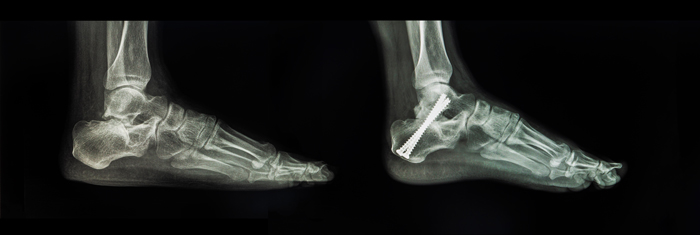JOINT FUSION Treatment & Diagnostics in C Scheme, Jaipur
JOINT FUSION
Joint fusions come to help when the conventional treatment cannot treat osteoarthritis. It is a safe surgery that efficiently treats ailments. Joint fusion also helps to achieve stability and improves the alignment of joints.

What is joint fusion?
Joint fusion is popularly known as Arthrodesis. Doctors mainly perform this surgery on arthritis patients to relieve them of extreme joint pains. The surgeons perform joint fusions in different parts of the human body like the thumb, fingers, wrist, spine, and ankle.
Who should go for joint fusion at Apollo Spectra, Jaipur?
- If you've arthritis and no treatment has worked for you, the doctor will recommend joint fusion
- If you have degenerative disk disease
- If you have scoliosis (a sideways curve in your spine)
When to see a doctor at Apollo Spectra, Jaipur?
- If you have arthritis and no medications have worked for you
- If the arthritis pain is too much to bear
- If the inflammation has damaged your joints or ligaments
Request an appointment at Apollo Spectra Hospitals, Jaipur
Call 1860 500 2244 to book an appointment.
How to prepare for the procedure?
- Your doctor will guide you properly before the surgery and tell you how to prepare for it.
- Your doctor will advise you to stop taking blood-thinning medicines like aspirin and ibuprofen.
- Tell your doctor if you have faced changes in your health recently.
- If you are a smoker, the doctor will ask you to stop smoking for some time.
- The doctor will prescribe you some tests that you will require to undergo before the joint fusion. These tests include CT scans, X-rays, Ultrasound, and Magnetic Resonance Imaging (MRI).
- You will require to fast the night before your surgery. You cannot drink water as well.
- You have to make some changes back at your home before you undergo the surgery. You will need proper rest after the surgery.
How is the joint fusion procedure done at Apollo Spectra, Jaipur?
The doctor will give you general anaesthesia or local anaesthesia for the procedure. The surgeon will make an incision on the skin to scrape off the damaged cartilages from the joint. This procedure will make the bones fuse. The surgeon will place a small piece of bone between the joints. He will take out a small bone from the knee, ankle, or pelvic bone. At times the bone is donated from the bone bank. He can also put an artificial substance that will act as a bone. The surgeon will close the space in the joint with a metal plate, screws, and wires. As these are permanent materials, they will stay there even after your joint recovers. After inserting the hardware, the surgeon will close the incision point with staples and sutures.
What is the recovery procedure after a joint fusion?
With time, the ends of your joint will fuse and grow to become one solid piece, and you will be unable to move it. Until your joint fully recovers, you will need to protect the area to ensure proper healing. The surgeon will ask you to wear a brace or cast in the area. The surgeon will advise you to keep all kinds of weight away from the joint. To do this, you will be required to walk with crutches, walkers, or go around in a wheelchair. Healing can take a minimum of 12 weeks. Ensure you have someone to help you out at home. Ask help from your friends and family members to go about your daily chores. You will have to cut short on some of the range of motions. You will also feel stiffness in your joints. Taking physiotherapy will help you a lot in your recovery process. Your doctor will prescribe non-steroidal anti-inflammatory drugs (NSAIDs) or opioids. These medicines will help lessen the pain in the joint.
Conclusion:
Although the recovery is long and takes time, joint fusion is a safe surgical procedure. It is one of the best ways to regain movement in the damaged joints. The arthritis pain will also get lessened.
It relieves arthritis pain and also gives the deformed joints a better shape and appearance. There will be an improvement in movement as well after joint fusion. The joint fusion will restore those movements that you lost previously and stabilize the area of the joint.
As the joint fusions are permanent, they do not move again. The pain in the joints will get lessened. There will also be an improvement in the mobility of the joints.
- Your doctor will ask you if you're ready for a long recovery process. If you are not comfortable with it, then you shouldn't go for joint fusion.
- If you have a poor quality of bones
- If you have an infection that will hinder the procedure of joint surgery
- If you have narrowed arteries
- If you have a neurological problem that keeps you from fast recovery
Symptoms
Our Top Specialities
NOTICE BOARD
CONTACT US
CONTACT US
 Book Appointment
Book Appointment


.svg)
.svg)
.svg)
.svg)








